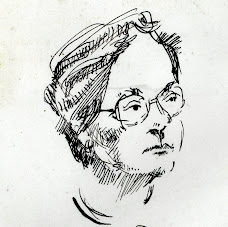
I have a lot of memories around JFK’s assassination: the PA announcement during sophomore English class; scurrying around after school, reporting for the student newspaper; the flags at half-staff throughout our small military housing area for the Commander-in-Chief; watching the funeral on television. In my social studies class that year, we kept journals -- “Intellectual Diaries,” Mr. Strauss called them. I remember writing about not knowing much about Lyndon Johnson, wondering whether he was up to the job. (Yes and no, would be my answer now.) But I also remember this: before all the Lee Harvey Oswald/Jack Ruby story was broadcast, most of the people I talked with believed the assassination would turn out to be the work of the John Birch Society, the Ku Klux Klan, the American Nazi Party, or some other far-right person or group. Yet as far as I recall, we believed the initial reports as well as that of the Warren Commission. I think most people still believed the U.S. government and whatever Cronkite or Huntley-Brinkley told us on the news, at that time.
Several years later, when I was in college, when we no longer trusted the government (or anyone over thirty except maybe Pete Seeger), when LBJ’s great achievements (civil rights, Medicare) were all but forgotten in the firestorm of Vietnam, a lot of people were reading Barbara Garson’s Macbird. My memory is that it was provocative, designed to shock, and implicated Johnson in Kennedy’s assassination. At about that same time, Jim Garrison’s court case against Clay Shaw was in the news. I was aware of it, but there was a lot of other news going on and I don’t think I focused on it much.
All this is to say that I don’t really feel qualified to judge the legitimacy of the claims Oliver Stone makes in this film, based in part on Garrison’s book as well as another by Jim Marrs. I can say that JFK was a compelling film that kept me glued to my seat for 3 1/2 hours (!). I gather that the version shown in theaters was not quite as long as the Special Edition DVD. I can say also that the evidence Kevin Costner, as Jim Garrison, presents is frighteningly believable. I’ll have to think about whether I want to read Garrison’s book or do further research. I know that for some years, many liberals believed that everything would have been fine had Kennedy not died, but more recently I’ve heard that some revisionist scholars looking at the Kennedy presidency weren’t so enthralled with him, and felt he mightn’t have done any better than Johnson. Yet Stone’s film asserts Kennedy had a plan for a quick exit from Vietnam, which encouraged the military-industrial complex (including Johnson associates Brown-Root – the Halliburton of the Vietnam War) to conspire in his assassination. Will we ever know the truth? Not sure. But I do believe this film was worth the time I spent on it and that I’ll be thinking about it for quite a while.


No comments:
Post a Comment